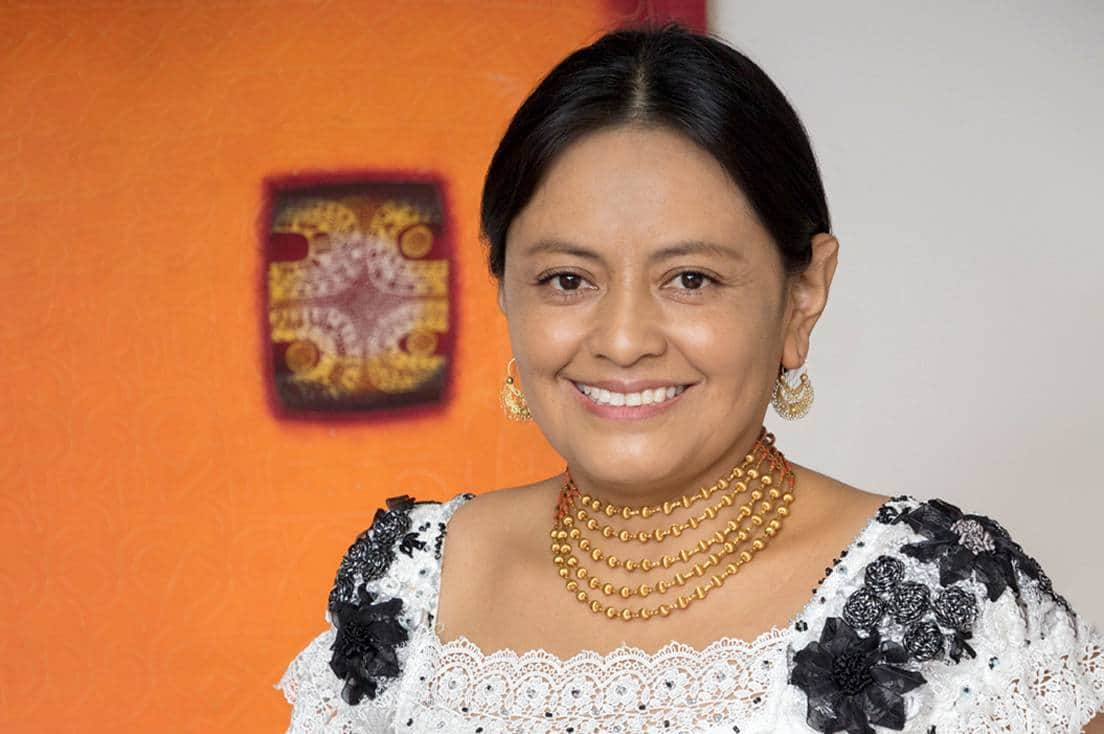Yana Lema, full name Yana Lucila Lema Otavalo (Peguche, Otavalo canton, Ecuador, 1974) is an Ecuadorian journalist, writer, poet, translator, cultural promoter, and college professor. She writes in Spanish and Quechua. For more than seven years, she worked as a presenter on the RTS Kichwapi newscast and later on Ecuador TV’s Willaykuna newscast. In 2016, she published her story “Chaska” in Quechua and Spanish, and in 2019, her collection of poems “Tamyawan Shamukupani.” Lema has participated in fairs and literary festivals in Quito, La Paz, Havana, Guadalajara, Guayaquil, Medellín, Bogotá, Mexico, and Genoa. In 2021, her poetry book “Tengo hambre de tu boca” won the Jorge Carrera Andrade Prize. She resides in Guayaquil and serves as a professor at the University of the Arts, where she teaches Oral and Latin American Literature.
Early Life and Education
Born in 1974 in Otavalo, a region renowned for its artisans, musicians, and weavers, Yana Lucila Lema embarked on a journey that intertwined her cultural heritage with academic pursuits. Her formative years were marked by an immersion in the rich tapestry of Kichwa traditions, which later influenced her professional and creative endeavors.
Lema pursued her higher education in Social Communication, specializing in Television, at the Central University of Ecuador. Her passion for storytelling and creative expression led her to delve into Creative Writing. She further honed her academic profile by earning a Masters of Social Sciences, concentrating on Indigenous Issues, at FLACSO. Additionally, Lema expanded her expertise in media by obtaining a degree in Audiovisual Journalism from the Jose Marti International Institute of Journalism in Cuba.
Career Highlights
Lema’s professional trajectory is a mosaic of contributions to indigenous communities and the broader field of communication. She has been an active collaborator with key indigenous organizations such as the Confederacy of Ecuadorian Indigenous Nationalities (CONAIE), the Confederacy of Indigenous Nationalities from the Ecuadorian Amazon (CONFENIAE), and the Confederacy of Peoples of Kichwa nationality (ECUARUNARI).
At CONAIE, Lema made a significant impact by creating videos that focused on reinforcing cultural identity among Indigenous peoples. One of her notable works, a video on traditional medicine, was lauded as the winner of the First Nations of Abya Yala Film Festival. Her skills in broadcasting were further showcased during her tenure as a presenter for the Kichwa language newscast KICHWAPI, which aired for over six years on the national channel RTS.
Literary Contributions and Recognition
Lema’s literary journey is marked by her deep engagement with indigenous themes and narratives. As a writer and poet, she has been an active participant in various international platforms, including the International Meeting of Indigenous Communicators and Writers in Indigenous Languages in Mexico, the Conference of the Association for Writers in Indigenous Languages of Mexico, and the International Poetry Festivals of Medellin and Bogota in Colombia.
Her poetic works have been featured in significant publications like “Las palabras pueden: Los escritores y la infancia” (UNICEF), the Ecuadorian indigenous nations’ poetry anthology “Ñaupa pachamanta purik rimaykuna / Antiguas palabras andantes” (Casa de la Ecuatoriana, 2016), and the special edition of Diálogo Magazine “Los cinco puntos cardinales en la literatura indígena contemporánea/ The five cardinal points in contemporary indigenous literature” (DePaul University, 2016).
Personal Life and Cultural Impact
Yana Lema, deeply connected to her Kichwa roots, finds inspiration in the landscapes and mythologies of her homeland. Her poetry, resonant with themes of love, heartbreak, and migration, mirrors the complexity of human emotions while staying true to the indigenous worldview. She resides in Guayaquil and serves as a professor at the University of the Arts, where she teaches Oral and Latin American Literature.
Lema’s personal journey and professional achievements reflect her commitment to preserving and promoting indigenous languages and cultures. Her work not only embodies the rich cultural heritage of Ecuador but also contributes significantly to the global tapestry of indigenous literature and communication.
Lemas has worked with the following indigenous organizations
- Confederación de Nacionalidades Indígenas del Ecuador (CONAIE)
- Ecuarunari/Confederación de Pueblos de la Nacionalidad Kichwa del Ecuador
- Confederación de Nacionalidades Indígenas de la Amazonía Ecuatoriana (CONFENIAE)
Awards and recognitions
- In the “Women, Images and Testimonies” contest in Cuenca, she received the publication award as a journalist.
- At the “Third Abya Yala First Nations Film and Video Festival” she received the award in the category “Best Traditional Medicine Video”.
- In 2021, her poetry book “Tengo hambre de tu boca” won the Jorge Carrera Andrade Prize.
Videos
Lucila Lema Otavalo / Poetry Festival: “Lenguas de América 2012”
Yana Lucila Lema Otovalo – Kichwa Otavalo indigenous people (Ecuador)
Works
Short stories
- 2016: Chaska. Quito: Santillana.
Poetry
- 2019: Tamyawan shamukupani (“con la lluvia respetuosamente estoy viniendo”). Ciudad de Guatemala: Tujaal Ediciones.
- 2021: Kampa shimita yarkachini (“Tengo hambre de tu boca”). Quito: Kinti rikra
Poetry compilations
- 2013: Hatun Taki: Poemas de la Madre Tierra y a los Abuelos. Quito: Ediciones Abya-Yala y Centro de Estudios sobre El Buen Vivir y Sumak Kawsay.
- 2016: Ñawpa pachamanta purik rimaykuna (Antiguas palabras andantes). Quito: Casa de la Cultura Ecuatoriana Benjamín Carrión, Dirección de Publicaciones.
- 2016: Chawpi Pachapi Arawikuna: Nuestra propia palabra. Quito: Editorial Abya-Yala.

